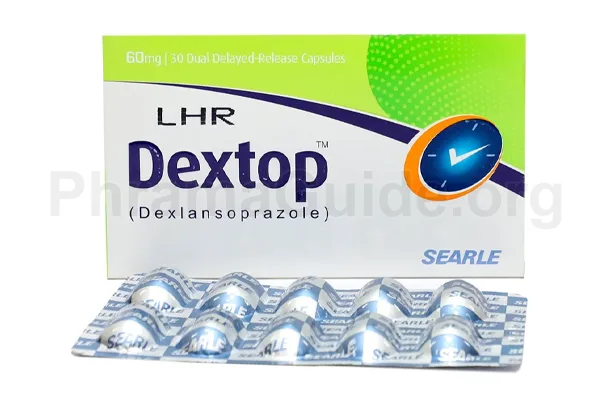Dextop is a proton pump inhibitor (PPI) used to reduce stomach acid and treat conditions like gastroesophageal reflux disease (GERD) and stomach ulcers. Like all medications, Dextop can have some common and less common side effects for some individuals.
Common Side Effects
- Headache: Some individuals may experience headaches while taking Dextop.
- Nausea or vomiting: This medication might cause feelings of nausea or, in some cases, vomiting.
- Abdominal pain or discomfort: Stomach discomfort, abdominal pain, or bloating could occur as a side effect.
- Diarrhea or constipation: Changes in bowel habits, including diarrhea or constipation, might be experienced.
- Flatulence (gas): Some people may notice increased gas or flatulence while taking Dextop.
- Upper respiratory infections: There might be an increased susceptibility to upper respiratory infections such as the common cold or sinusitis.
- Dizziness or fatigue: Feeling dizzy or experiencing fatigue could occur in some individuals.
- Joint pain: Joint pain or muscle pain might be experienced as a side effect.
- Skin reactions: In rare cases, allergic reactions such as skin rash or itching may occur.
Less Common Side Effects
- Liver problems: Rarely, Dextop can affect liver function, leading to elevated liver enzymes or, in extremely rare cases, liver damage. Symptoms of liver problems might include yellowing of the skin or eyes (jaundice), dark urine, or persistent abdominal pain.
- Low magnesium levels: Prolonged use of proton pump inhibitors like Dextop may rarely lead to low magnesium levels in the blood (hypomagnesemia). Symptoms can include muscle spasms, irregular heartbeat, seizures, or fatigue.
- Vitamin B12 deficiency: Long-term use of PPIs may reduce the absorption of vitamin B12, potentially leading to deficiency-related symptoms such as fatigue, weakness, or neurological issues.
- Clostridium difficile-associated diarrhea: In some cases, PPIs like Dextop might increase the risk of developing Clostridium difficile-associated diarrhea, which can be severe and require medical attention.
- Bone fractures: Prolonged use of high doses of PPIs, especially in older adults, has been associated with a slightly increased risk of bone fractures, particularly hip, wrist, or spine fractures.

What is Dextop?
Dextop is one of the leading brands of dexlansoprazole, manufactured and marketed by Searle (Pakistan) Ltd.
Dextop : Available Formulations and Strengths
Presently, Dextop is available in Capsules Form.
Dextop Capsules : 30mg and 60mg strengths.
What Are The Possible Drug Interactions of Dextop?
- Medications metabolized by CYP2C19: Dextop can inhibit the activity of the enzyme CYP2C19, which is involved in metabolizing various drugs. Medications that rely on this enzyme for metabolism, such as certain benzodiazepines (like diazepam), some antidepressants, and antiplatelet drugs like clopidogrel, might have altered effectiveness or increased side effects when taken with Dextop.
- Warfarin and other anticoagulants: PPIs like Dextop may interact with anticoagulant drugs such as warfarin, potentially increasing the risk of bleeding. Regular monitoring of blood clotting parameters is advisable when using these medications together.
- Methotrexate: There is a potential interaction between PPIs and methotrexate, a medication used to treat conditions like rheumatoid arthritis and certain cancers. PPIs might increase the level of methotrexate in the blood, leading to increased side effects of methotrexate.
- Digoxin: Dextop may slightly increase the absorption of digoxin, a medication used for heart conditions. Monitoring digoxin levels is recommended when starting or stopping Dextop.
- Antiretroviral drugs: PPIs might interact with certain antiretroviral drugs used in HIV treatment, potentially reducing their effectiveness. It’s crucial to consult with a healthcare provider when combining these medications.

Leave A Comment